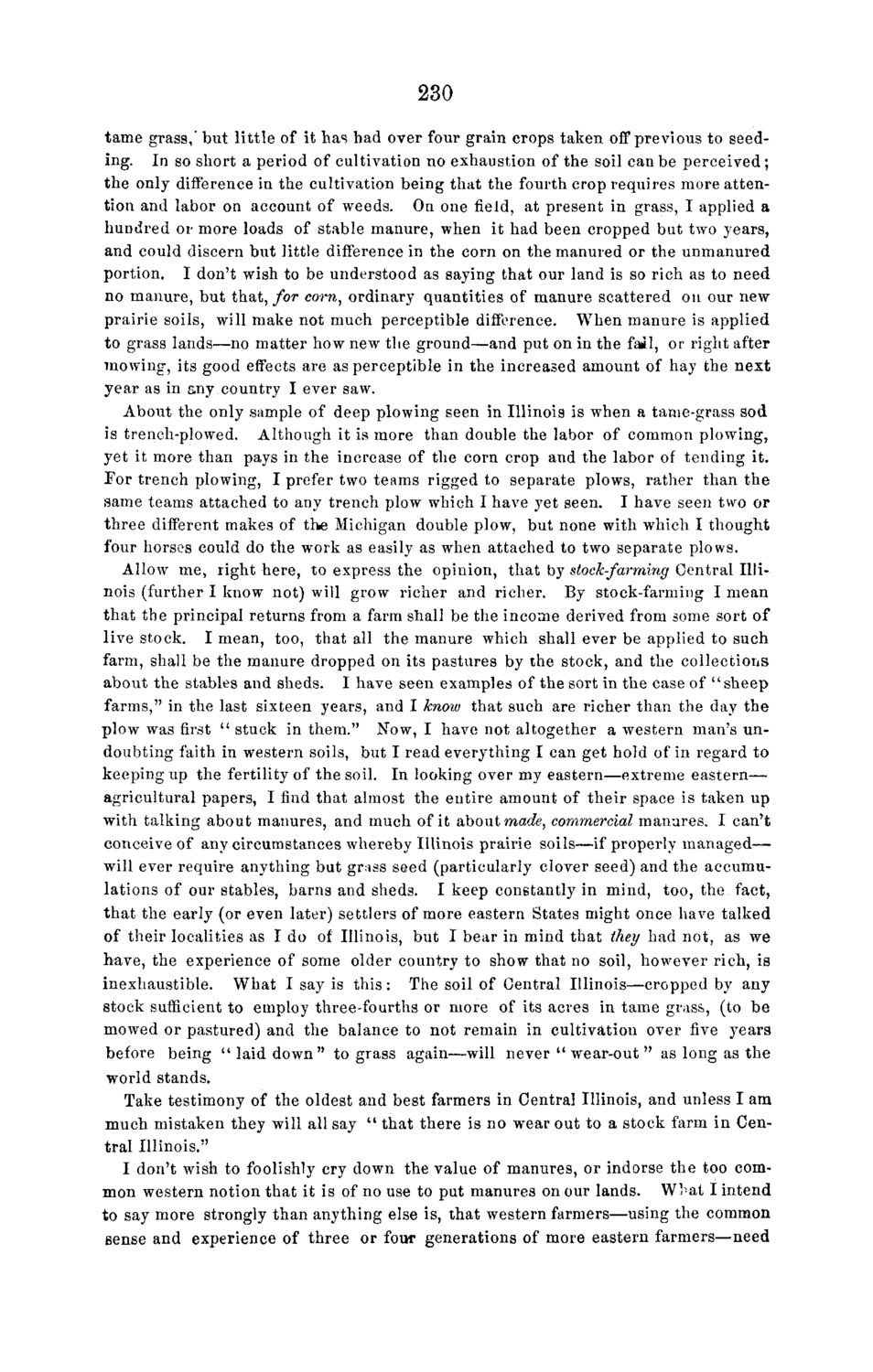| |
| |
Caption: Board of Trustees Minutes - 1868
This is a reduced-resolution page image for fast online browsing.

EXTRACTED TEXT FROM PAGE:
230 tame grass,' but little of it has had over four grain crops taken off previous to seeding. In so short a period of cultivation no exhaustion of the soil can be perceived; the only difference in the cultivation being that the fourth crop requires more attention and labor on account of weeds. On one field, at present in grass, I applied a hundred or more loads of stable manure, when it had been cropped but two years, and could discern but little difference in the corn on the manured or the unmanured portion. I don't wish to be understood as saying that our land is so rich as to need no manure, but that, for corn, ordinary quantities of manure scattered on our new prairie soils, will make not much perceptible difference. When manure is applied to grass lands—no matter how new the ground—and put on in the fail, or right after mowing, its good effects are as perceptible in the increased amount of hay the next year as in any country I ever saw. About the only sample of deep plowing seen in Illinois is when a tame-grass sod is trench-plowed. Although it is more than double the labor of common plowing, yet it more than pays in the increase of the corn crop and the labor of tending it. For trench plowing, I prefer two teams rigged to separate plows, rather than the same teams attached to any trench plow which I have yet seen. I have seen two or three different makes of the Michigan double plow, but none with which I thought four horses could do the work as easily as when attached to two separate plows. Allow me, right here, to express the opinion, that by stock-farming Central Illinois (further I know not) will grow richer and richer. By stock-farming I mean that the principal returns from a farm shall be the income derived from some sort of live stock. I mean, too, that all the manure which shall ever be applied to such farm, shall be the manure dropped on its pastures by the stock, and the collections about the stables and sheds. I have seen examples of the sort in the case of "sheep farms," in the last sixteen years, and I know that such are richer than the day the plow was first " stuck in them." Now, I have not altogether a western man's undoubting faith in western soils, but I read everything I can get hold of in regard to keeping up the fertility of the soil. In looking over my eastern—extreme eastern— agricultural papers, I find that almost the entire amount of their space is taken up with talking about manures, and much of it about made, commercial manures. I can't conceive of any circumstances whereby Illinois prairie soils—if properly managed— will ever require anything but grass seed (particularly clover seed) and the accumulations of our stables, barns and sheds. I keep constantly in mind, too, the fact, that the early (or even later) settlers of more eastern States might once have talked of their localities as I do of Illinois, but I bear in mind that they had not, as we have, the experience of some older country to show that no soil, however rich, is inexhaustible. What I say is this: The soil of Central Illinois—cropped by any stock sufficient to employ three-fourths or more of its acres in tame grass, (to be mowed or pastured) and the balance to not remain in cultivation over five years before being " laid down" to grass again—will never u wear-out " as long as the world stands. Take testimony of the oldest and best farmers in Central Illinois, and unless I am much mistaken they will all say " that there is no wear out to a stock farm in Central Illinois." I don't wish to foolishly cry down the value of manures, or indorse the too common western notion that it is of no use to put manures on our lands. W>at I intend to say more strongly than anything else is, that western farmers—using the common sense and experience of three or four generations of more eastern farmers—need
| |